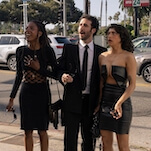Prozac Nation

Prozac Nation premièred to little regard at the 2001 Toronto Film Festival, just a few days before 9/11. Five months later, author Elizabeth Wurtzel, who wrote the autobiographical bestseller on which it was based, said this about the tragedy: "I had not the slightest emotional reaction. I thought, 'This is a really strange art project.' It was the most amazing sight in terms of sheer elegance. It fell like water. It just slid, like a turtleneck going over someone's head." Wurtzel's comments no doubt influenced Miramax's decision to shelve the film for nearly four years before quietly shuffling it to cable and then DVD, but the movie really speaks for itself. In a post-9/11 world, there's really no reservoir of sympathy deep enough to support a whiny, navel-gazing Harvard student who turns her depression into a show-stopping spectacle. Is it any wonder that the Twin Towers falling drew such a callous reaction from Wurtzel? Sept. 11 was a day when all the attention wasn't focused on her.








































